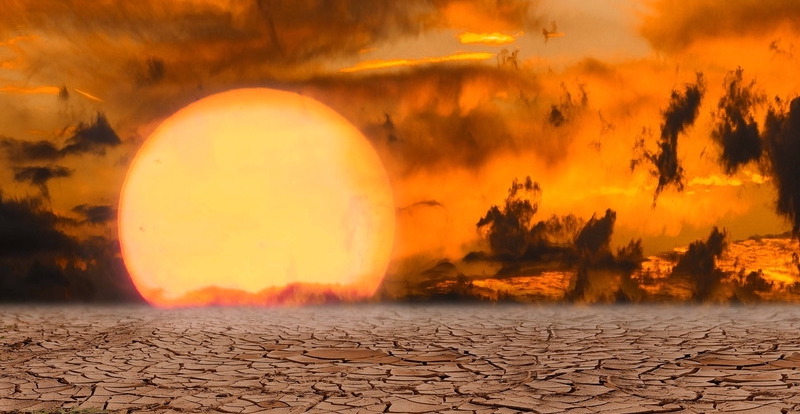As a child, I grew up singing a song in church which ended with the lines, “As it was in the beginning / is now and ever shall be / world without end / amen, amen.” I loved the way the song sounded like a hope, a plea—not like something promised or certain. My new book’s title, World Without End, comes from this song.
The essays in World Without End explore a range of apocalypses: from the evangelical Christian vision of apocalypse as a God-sent end of the world, to the secular apocalypses unfolding all around us—whether through the climate crisis and mass extinction events, or the degradations of capitalism and extractive industry, or the growing influence of Christian fundamentalism on American civic life—to quiet, private apocalypses, like the bewilderment that accompanies a personal loss of faith.
I have always been drawn to books that grapple with—and seek to undermine, complicate, and create new meanings from—visions of apocalypse. Here are some to consider.
*
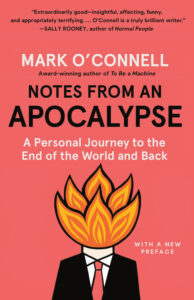
Notes from an Apocalypse: A Personal Journey to the End of the World and Back by Mark O’Connell
Mark O’Connell’s Notes from an Apocalypse begins, “It was the end of the world, and I was sitting on the couch watching cartoons with my son.” The following chapters explore myriad apocalyptic visions. On prepping, O’Connell writes that survivalists offer “not so much a prediction of the future as a deeply political interpretation of the present.” At a former army munitions facility in the Black Hills of South Dakota recently purchased by a real estate mogul specializing in luxury bunkers (“a fever dream from the depths of the libertarian lizard-brain”), O’Connell writes, “All of this was a logical extension of the gated community. It was a logical extension of capitalism itself.”
In New Zealand, where tech billionaires like Peter Thiel are purchasing vast acreage for personal apocalyptic retreats, O’Connell writes, “[Thiel] was pure symbol: less an actual person than a shell company for a diversified portfolio of anxieties about the future”. In a chapter exploring Elon Musk’s fantasies of colonizing Mars, O’Connell recalls a conversation he had with his five-year-old son at a science museum: “‘I don’t want to go to Mars,’ he had said. ‘It doesn’t look nice.’ He was right, I thought. It looked like a total shithole.”
I didn’t know a book about apocalypse could be so funny. And though I never manage to read the book’s final chapter, about parenting, without crying, O’Connell’s humor largely transforms what could be an otherwise bleak book into a deeply pleasurable and moving exploration of the ways our fantasies and fears about the end(s) of the world might be instructive for the futures we are creating and living into with each passing day.

Lessons for Survival: Mothering Against “The Apocalypse” by Emily Raboteau
In Lessons for Survival, Emily Raboteau chronicles overlapping crises: pollution and white supremacy, extreme heat and flooding, gun violence and gentrification and the pandemic, her father’s dementia and death. Losses on scales both global and intimate, as they always are.
The structure of the book, itself, is a form of resistance to apocalypse. Essays are dated, but do not appear chronologically. Many of the essays are fragmented in some way—they are made up of short entries, or are broken up by the author’s photographs. As a mother to two small children, I love the way fragmented forms conjure the interruptions of caregiving, creating layers of time which overlap onto the present haphazardly. And any resistance to chronological time—any disruption of it—is also a resistance to apocalyptic thinking, which relies on a neat chronology of beginning, middle, and end.
In one of her final essays, as she grieves the death of her father, Raboteau lists forms of ambiguous loss: “incarceration, migration, divorce, displacement, miscarriage, terrorism, addiction, pandemic, climate chaos, or dementia, like my dad’s.” Raboteau reminds the reader of the way we care for ourselves and others weathering ambiguous loss: “The therapeutic guidance for such trauma,” she writes, “is toward building resilience.”
In a coastal Alaskan village, Raboteau attends worship in a Catholic church perched on stilts. After the service ends, the Yu’pik church members tell her of their own losses: the river is dirty, and too warm; homes have been lost to erosion; there are fewer fish, which means less community fishing; fewer beluga whales; less permafrost. When she asks the church deacon how he reconciles “the need for justice with the need for forgiveness,” he smiles, and his answer echoes Raboteau’s own answer for weathering loss and change. “That’s easy,” the deacon replies. “We take care of each other.”
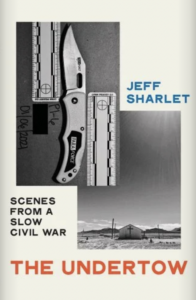
The Undertow: Scenes from a Slow Civil War by Jeff Sharlet
The least optimistic book in the list, but the most clear-eyed and clarifying excavation of the Far Right and its spiritual deprivations, from the vacuity of “hipster Christendom” to the red-pilled, “great phallic oversoul” of the manosphere; the conspiratorial gnosticism of Trump devotees and the perverse prosperity gospel of Trump’s rallies where, Sharlet writes, it is as if “loss itself, the very concept of grief, had been disappeared.”
I read The Undertow a couple years ago and there are specific images I have never been able to shake: an emaciated moose covered in glistening ticks, a family cat lying amid a massive pile of guns, a three-year-old child lying on his belly, shooting an automatic rifle. The heaviness is punctuated by Sharlet’s photography, his hysterically funny observations, as well as painfully beautiful meditations on the prophetic imagination of Harry Belafonte and Occupy Wall Street protestors—who Sharlet describes as fools “in the holy tradition, the one that speaks not truth to power but imagination to things as they are.”
Sharlet writes from “the aftermath,” peering into the deepest darkest reaches of a world wrought by the entangled forces of white Christian nationalism, fascism, and authoritarianism. Still, Sharlet draws us forward: “We will need new songs if we are to make it through what is to come—what is already here. I am not the one to write them. My hope is less than that: only that this book may reveal fault lines within our fears, in which others will find better words our children may one day sing.”
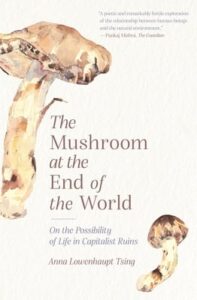
The Mushroom at the End of the World: On the Possibility of Life in Capitalist Ruins by Anna Lowenhaupt Tsing
The book that was my personal gateway drug to apocalyptic nonfiction, The Mushroom at the End of the World is an innovative, layered book that evokes a present world marked by environmental degradation and capitalism, as well as a wide range of possible futures expressed through stories of the matsutake—a highly valuable edible mushroom—and the communities of matsutake pickers Lowenhaupt Tsing encounters in Oregon, China, and Finland.
Short chapters meditating on resurgence, disturbance, notions of progress, and the smell of the matsutake mushroom are broken up by the author’s own tiny line drawings of mushrooms and spores; black and white photographs of Japanese chefs, pickers armed with rifles, and Finnish reindeer; and wide-ranging epigraphs quoting Laotian mushroom buyers, John Cage’s translations of Basho’s poetry, and Samuel Beckett.
An expression of contingency, improvisation, and collaboration, The Mushroom at the End of the World always reshapes my own conceptions of what books can be like, and what stories can do and include, and how life can and will change in the face of catastrophe. “Neither tales of progress nor of ruin tell us how to think about collaborative survival,” Lowenhaupt Tsing writes. “It is time to pay attention to mushroom picking. Not that this will save us—but it might open our imaginations.”
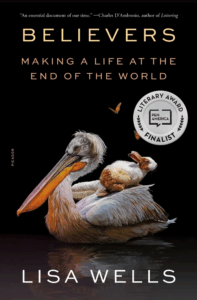
Believers: Making a Life at the End of the World by Lisa Wells
Early in Believers, Lisa Wells writes, “If we imagine that our civilization is already in collapse, the question we are faced with is this: How, then, shall we live?” This question, lifted from scripture, becomes the animating question of the book as Wells meets with an eccentric cast of characters looking for alternate ways of life that contribute to the flourishing of all creatures.
Wells encounters an “itinerant outlaw” devoted to sowing the desert with edible wildflowers; she meets with intentional communities of “rewilding” Christians working to rehabilitate and decolonize their inherited faith; she learns the art of tracking from one of the best trackers alive. The accumulation of stories gives voice to the multiplicity of solutions to the myriad crises we face. Throughout, Wells’ perspective threads a needle, springing from lost idealism but “beyond cynicism or despair.”
Believers is a book of generative, apocalyptic imagination: in the face of the necessary collapse of many oppressive and unsustainable empires, Wells invites us to imagine new ways of living—new ways of being—in the world. “Another world is coming, one we can’t yet see,” she writes. “This threshold asks that we imagine it anyway.”
__________________________________
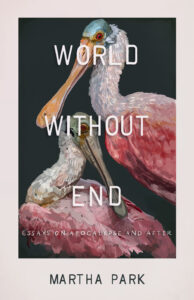
World Without End: Essays on Apocalypse and After by Martha Park is available from Hub City Press.
